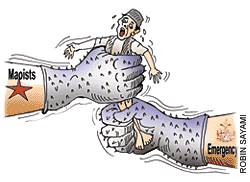 The two protagonists in the present crisis-the extreme right and the extreme left-want the same thing: an extension of the emergency, and neither side cares too much for elections. The constitution has provided polls as a way out of this stalemate, but neither side is going to let the people vote.
The two protagonists in the present crisis-the extreme right and the extreme left-want the same thing: an extension of the emergency, and neither side cares too much for elections. The constitution has provided polls as a way out of this stalemate, but neither side is going to let the people vote. That is the paradox of Nepal's politics: the enemies seem to want the same result. And they are pitted against parliamentary parties and Nepalis who haven't given up on democracy. There are signs the extreme right is now more royal than the king, and the resignation Thursday of the king's nominee to the upper house, Dipta Prakash Shah, is an indication that his views were too hardline to digest.

Shah told us: "I resigned because I sensed that certain forces didn't like what I had said about the role of the constitutional monarchy." In an interview with Rajdhani, Shah had said Tuesday that the king can use Article 127 to amend the constitution and take necessary powers. The resignation shows that political regression may not be as easy as the rightists want.
Given this undercurrent, it doesn't seem to matter anymore which faction of the Congress gets the tree symbol. Or if the emergency is extended or not. In fact, even without a formal emergency, the country is in a state of emergency.
Since the emergency went into force in November, no one won. Everyone lost. Parliamentary parties have been emasculated, the Maoists are weakened, the strength of the army has dragged into public debate, the office of prime minister is even less powerful than it was, and the monarchy's public image is quiescent. Who benefited from all this? Certainly not the Nepali people.
They have been the biggest losers. The economy has been battered, investments are zero, unemployment is rife. They have lost purchasing power, markets, food supply, health services, education, and personal security. Caught between the ruthlessness of the Maoists and counter-attacks from security forces, Nepalis have never before faced such deprivation and insecurity.
An alternative to elections would be postponed elections. The Maoists have squandered popular support, and it would be possible for the government to keep them at bay and hold some form of elections. But will it be able to convince the army, the palace and certain foreign governments that it can?
There is a sense that something has to give in the coming weeks. The situation is so fluid that even the most outlandish political alliances are now possible.
The defence establishment is fairly clear that military might alone is not going to be enough to finish off the Maoists. The idea is to put sufficient pressure on them to bolster the bargaining position in future talks. And this is also the intention of the Maoists who have already begun their senseless mayhem in the run-up to the 16 September strike. A tightening noose at home, increased pressure from India, and internal dissent have prompted the Maoists to send out peace feelers.
On the political front, Deuba has played out all his cards, and his cabinet is self-destructing. The media-led campaign against Deuba loyalist Chiranjibi Wagle this week is orchestrated by his own cabinet colleagues over construction contracts. "Deuba's left hand is destroying his right hand," is how a political insider put it. Given this scenario, and a rumoured meeting between Girija Koirala and the king on Friday, don't be surprised if the Nepali Congress begins a process of reunification.


